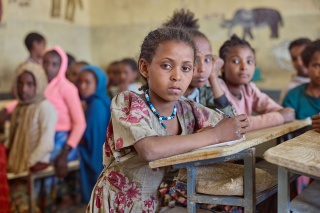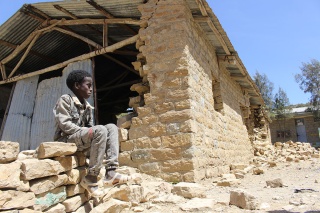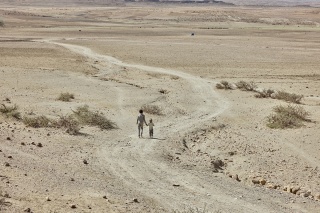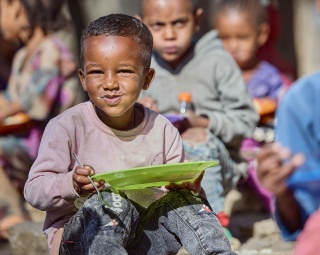
Ethiopia’s cry for food falls on the world’s deaf ears
Founder of Mary’s Meals, Magnus MacFarlane-Barrow, is sounding the alarm over the hunger crisis in Tigray and urging immediate action
Mary’s Meals Founder Magnus MacFarlane-Barrow is urging people to take immediate action to prevent widespread starvation following a recent trip to the war-damaged region, as we launch an emergency appeal to reach children on the brink of starvation.
More than 91% of Tigray’s population has been “exposed to the risk of starvation and death”, according to the president of Tigray’s Interim Regional Administration, Getachew Reda, and millions are in desperate need of food aid (1). The region recently endured two years of deadly civil war that displaced millions, destroyed essential infrastructure and health services, and is estimated to have claimed the lives of upwards of 600,000 people.
Interruptions to aid supplies in 2023, compounded by several failed rainy seasons in recent years resulting in severe drought, have left lives and livelihoods in ruins and accelerated the region’s humanitarian crisis. Current IPC hunger projections suggest that the majority of Tigray is experiencing IPC Phase 4 ‘emergency’ levels of hunger, with predictions that “some households will likely be in Phase 5 ‘catastrophe / famine’ by July” (2).

In the biggest hospital in the region’s capital (Mekelle), Dr Abraha Gebreegziabher, a local paediatrician, explains that more and more children are dying from malnutrition in his hospital: “We are seeing three times as many cases of malnutrition as normal, and the mortality rate is five times higher. The number of children dying from malnutrition was quite stable for the last 13 years, but since the war, it’s doubled. Previous deaths were generally linked to other health conditions, but now malnutrition is a singular cause on its own.”
At a time when journalists are struggling to gain access to the region, this situation is going largely unreported.
Children’s futures hang in the balance as years of disruption, conflict, displacement, drought, and disease mean that millions of children are out of school (3). Regional statistics suggest that more than half of all primary-age children in Tigray (53%) are not currently enrolled.

The situation is made worse by serious staff shortages and damage to school buildings sustained during the conflict – approximately 15,000 teachers are still unaccounted for and 95% of classrooms in the Central Zone of Tigray [an area where much of our school feeding takes place] are damaged as a result of the war.
Magnus says: “It’s hard to exaggerate just how serious the situation is in Tigray. People are already dying of hunger and everything we're hearing on the ground points to a well-founded fear of much worse to come if the world doesn’t respond. We’ve heard accounts of children who no longer feel the pain from hunger pangs, not because they have eaten, but because they don’t have the energy to feel pain anymore.

“It’s hard not to make comparisons between how the world was so moved to act nearly 40 years ago when Ethiopia was gripped by the infamous famine of the 80s and the situation today that is virtually being ignored. We need to make sure that the terrible outcome Tigray is heading for doesn’t happen, but it will if we don’t act now.”
Mary’s Meals has been operating in Ethiopia since 2017. We work with a trusted local partner to mobilise local communities in serving nutritious school meals in places of education to generate long-term community led growth and resilience through education and nutrition. During the conflict, while school feeding had to pause, we continued working with our partner to provide hot meals and other essential support to more than 30,000 internally displaced people sheltering in camps.
School feeding was reinstated soon after schools began reopening and is currently providing nutritious meals to more than 45,000 children in the region every school day, having doubled the size of the programme since Christmas. Our partner is poised to extend the programme to new schools and reach thousands more children, as funds allow. (All of the schools where Mary’s Meals’ school feeding programme operates are in areas currently projected to be in Phase 4 emergency, the second highest category for food insecurity) (4).

Mary’s Meals has just launched a crisis appeal to invite support from around the world and to spotlight Tigray’s deepening humanitarian crisis. Sharing stories of people we have encountered in the region in the past weeks, we hope to underline the critical need for simple daily meals in schools like Ara Primary School in Eastern Tigray.
The school has been open since the conflict eased, but more than 300 pupils have failed to return – many of them having to work instead, in the hope of receiving something to eat. The small numbers of children who are attending are barely able to interact because of what they have endured and their unrelenting hunger. When the surrounding community heard Mary’s Meals representatives were visiting Ara Primary School, 15 students registered for school in just a few hours.

Head teacher Weynareg Araya says: “The community wants this school to continue but, in some houses, they want their children to support them to make money. There is frustration in the homes because of hunger, but they know how important school is. A school feeding programme would be important here. It will support students to be active and learn. Those out of school will come back, and they will be energetic to learn.”
Magnus concludes: “Everywhere we go, people are asking us to expand our programme to schools so that we can keep the children fed and in school because their education will determine the future. One of the defining things about this situation is that we can – and are ready to – roll out the Mary’s Meals programme to many more schools if we can mobilise more support and raise the necessary funds. Clearly the need for that is enormous. Please join us in acting now.”

Sources
- https://x.com/reda_getachew/status/1740689812116689038?s=46&t=htP6TVFPkip2s6o6j0s-Tw
- https://fews.net/sites/default/files/2024-01/FAOB-January%202024.pdf
- https://reliefweb.int/report/ethiopia/ethiopia-education-cluster-quarterly-newsletter-october-december-2023
- https://fews.net/east-africa/ethiopia

